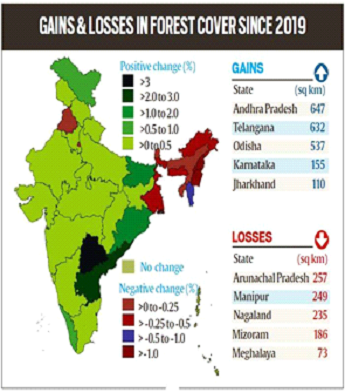

Context
In India, the forest certification industry is growing at 8 to 10 per cent every year, mainly catering to exporters wanting to tap the US and European markets that have strict regulations to ensure the legality of wood products coming in.
About:
- Just 5 per cent of India’s natural forests are currently certified, all in Uttar Pradesh.
- Forest certification is a sunrise industry, driven by a growing preference to avoid any product that can be linked to deforestation or illegal logging.
- Only processed wood is allowed to be exported from India, not raw wood.
Forest Certifications:
- Forest certification, a global movement initiated in 1990s after Rio Earth Summit, is a market-based non-regulatory conservation tool designed to promote sustainable management of forests and trees outside forests by an independent third party.
- As several developed countries have put trade restrictions on import of non-certified timber, non-timber forest products and wood-based goods into their countries, getting sustainable forest management certificates has become mandatory for exports.
Significance and the need for forest certification:
- Forest certification has been accepted as an efficient tool for forest management world over.
- Given that forests of India serve important ecological, economic and social functions that also provide livelihood to over 275 million forest dependent people of this country, there is need for certification for sustaining and enhancing these roles of forests.
Forest certification in India:
- The council of Programme for Endorsement of Forest Certification (PEFC) has decided to recognised forest-certification scheme developed specifically for Indian forests by Network for Certification and Conservation of Forests (NCCF), an Indian non-profit.
Key features:
- The Certification Standard for Sustainable Forest Management developed by NCCF is the first forest-certification scheme from India to get global recognition.
- The Standards evolved were India specific and was based on key elements of existing models in India such as the Bhopal India Process of the IIFM, the National Working Plan Code and the provisions contained in the National Forest Policy for the promotion of afforestation, sustainable utilization of forest products and growth of the forest-based industries.
|
Network for Certification and Conservation of Forests (NCCF): NCCF is a non-profit organisation came into existence in January 2015 as a Society to have a globally aligned certification program.
|

Programme for Endorsement of Forest Certification:
Programme for Endorsement of Forest Certification (PEFC) is the world’s largest forest certification system which seeks to transform the way forests are managed globally and locally to ensure that all of us can enjoy the environmental, social and economic benefits that forests offer.


